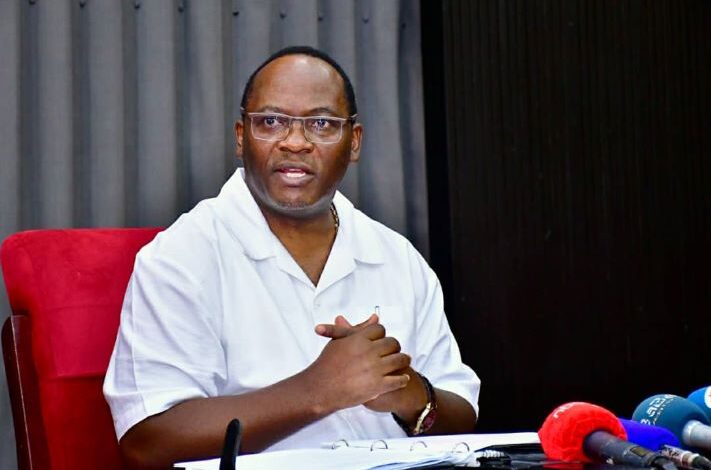Mpuuga’s Proposed Landmark Constitutional and Electoral Reforms Amendments Unveiled

In a strategic move to transform Uganda’s electoral landscape, the former Leader of the Opposition in Parliament (LoP) Mathias Mpuuga has unveiled a comprehensive plan for constitutional and electoral reforms.
Mpuuga’s ambitious initiative aims to address long-standing issues plaguing the country’s democratic process, prioritizing meaningful change and empowering citizens.
Taking the first step towards realizing these reforms, the former LoP orally notified Parliament of his readiness to move a private member’s bill this week.
During a news conference at Parliament on September 26th, 2024, an articulate Nyendo-Mukungwe MP emphasized that he would seek leave next week to introduce a 3-tier Constitutional and Electoral Reforms bill.
The Parliamentary Commissioner told the press, that his constitutional and electoral reforms would comprise three main areas of reform; areas amendable by the referendum, areas amendable by the Parliament, and areas focused on local government amendments.
Key Reforms Proposed
In his propositions, Mpuuga seeks to amend the Presidential Elections Act, to provide for the declaration of the presidential election results at the constituency level by the same presiding officer who declares members of parliament (MPs).
This will outlaw the current system allowing the Electoral Commission chairperson to declare results from the national tally centre.
Mpuuga seeks to restore and “entrench” the presidential term limits which he argues, was the “basic structure of the constitution,” before its removal in 2005 by Parliament in favor of the sitting President Museveni.
He proposes to enlarge the timeline for the petitioning of the court to 60 days in case the poll results aggrieve any presidential candidate. To tame the incumbent’s “appetite” to foil candidates’ desire to petition court through house arrest curtailment, Mpuuga wants the locus to be widened to every “eligible voter” to be allowed to challenge presidential results in the court.
“I want us to amend two critical areas; we should enlarge the time for a presidential candidate to go to court…and I want us to amend the constitution to say, that even a registered voter can go to court and petition such that the appetite to arrest would-be complainants to reduce…” Mpuuga said.
He added, “I want us to change the law to say that the same returning officer who declares MPs, must also declare a winning president for the district…”
With approximately 4 million Ugandans living abroad, among which approximately 2 million are eligible voters, Mpuuga advocates for their right to vote, citing their significant contributions to the country’s GDP, and he wants prisoners to claim their “civic right” to vote.
He also seeks to introduce an upper house comprising 39 MPs from Uganda’s original districts that were crafted at the formation of Uganda at the gaining of independence in 1962.
“The deputy president in my proposal, will be on the ballot with the president. The idea of a president simply appointing the vice president to attend funerals must stop. We must have a deputy president elected with the president on the same day as the president, and I am proposing the president and the deputy should not come from the same region.”
To cut on the size of the lower house, Mpuuga seeks to amend the constitution to provide for the election of MPs from the districts, across Uganda, and the introduction of proportional representation for especially woman MPs.
“Instead of having constituency MPs, I am proposing we have directly elected MPs from 146 districts. We shall retain the women MPs…” Mpuuga said.
He seeks to provide for the direct joining of parliament by a presidential candidate who emerges second runner-up in the national election to curb undue conflicts between the leader of the opposition in parliament, and party presidents and allow him space to “imprint his ideas” through legislature.
To bring these reform proposals to fruition, the former LoP expressed his preparedness to consult with all stakeholders to inform the drafting of his private member’s bills that encompass all the aspirations.
Overall, Mpuuga emphasized his commitment to creating enduring laws that will usher in genuine change, rather than merely legislating for “dreamers.”
Constitutional and Electoral Reforms in Brief
Electoral Reforms
- Declare presidential candidates at the polling station
- Introduce proportional representation for woman MPs,
- Extend the timeframe for petitioning court results.
- Giving voters locus to petition the Court to challenge presidential elections
Constitutional Amendments
- Restore and Entrench term limits
- Introduce an upper house chaired by the deputy president
- Reduce Parliament’s size.
- Allow Diaspora voters and prisoners to vote
- Allow the second runner-up to directly emerge the LoP
By introducing these comprehensive reforms, the former LoP seeks to redefine Uganda’s electoral landscape, prioritizing meaningful change and empowering citizens.
